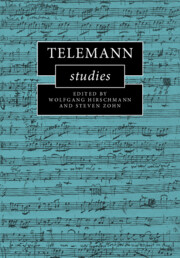Book contents
- Telemann Studies
- Cambridge Composer Studies
- Telemann Studies
- Copyright page
- Contents
- Figures
- Music Examples
- Tables
- Appendices
- Contributors
- Preface
- Abbreviations
- Part I Enlightenment Perspectives
- Part II Urban and Courtly Contexts
- 4 Telemann, Lüneburg, and Roger Brown
- 5 Hamburg Passion Music at Telemann’s Arrival
- 6 The Testament of Prince Johann Ernst of Saxe-Weimar
- Part III Nature (and) Theology in the Late Vocal Works
- Part IV Bach Family Connections
- Part V Cantata Cycles in Frankfurt, Hamburg, and Beyond
- Index of Telemann’s Works
- General Index
4 - Telemann, Lüneburg, and Roger Brown
from Part II - Urban and Courtly Contexts
Published online by Cambridge University Press: 14 July 2022
- Telemann Studies
- Cambridge Composer Studies
- Telemann Studies
- Copyright page
- Contents
- Figures
- Music Examples
- Tables
- Appendices
- Contributors
- Preface
- Abbreviations
- Part I Enlightenment Perspectives
- Part II Urban and Courtly Contexts
- 4 Telemann, Lüneburg, and Roger Brown
- 5 Hamburg Passion Music at Telemann’s Arrival
- 6 The Testament of Prince Johann Ernst of Saxe-Weimar
- Part III Nature (and) Theology in the Late Vocal Works
- Part IV Bach Family Connections
- Part V Cantata Cycles in Frankfurt, Hamburg, and Beyond
- Index of Telemann’s Works
- General Index
Summary
This chapter considers Telemann’s professional networks in Hamburg’s environs, using Lüneburg as a case study. Among the works acquired by institutions and individuals in Lüneburg were numerous manuscript overture-suites and several published collections by Telemann, including the Musique de table (Hamburg, 1733), Nouveaux quatuors en six suites (Paris, 1738), and the Musikalisches Lob Gottes in der Gemeine des Herrn (Nuremberg, 1744). Regular performances of the music are likely to have occurred in the city, even if these were seldom documented. The composer’s personal contacts with Lüneburg led to a visit there in 1735. Additionally, two of his former students auditioned for the organist position at St. John’s Church, both bearing letters of recommendation from him. Johann Christoph Schmügel was unsuccessful in 1754, but obtained the position in 1758 (when the auditions involved two fugue themes by Telemann); Caspar Daniel Krohne was unsuccessful in his bid to succeed Schmügel in 1766. The chapter also establishes that the theologian Roger Brown, who spent much of his career in Lüneburg as senior pastor of St. Michael’s Church and the city’s school superintendent, had previously copied out works by Telemann while working as a scribe for the Hamburg Opera’s archive.
- Type
- Chapter
- Information
- Telemann Studies , pp. 73 - 97Publisher: Cambridge University PressPrint publication year: 2022

